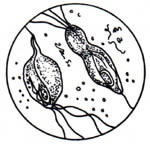
Trichomoniasis is a sexually transmitted infection (STI). It occurs in teens and adults and affects both men and women.
Trichomonads (how they look under a microscope):

What causes trichomoniasis?
Trichomoniasis is an infection caused by a single-cell parasite called Trichomonas vaginalis. The parasite is spread through sexual intercourse, so it’s an STI.
The parasite most commonly infects the urethra (the tube that carries urine from the bladder to outside the body) and penis. It can also infect the vulva or vagina. It is uncommon for the parasite to infect other parts of the body, such as hands, mouth, or anus. Most people with trichomoniasis do not have symptoms, so they may not get treated and may spread the infection to their partners without even knowing it.
Who is a risk for trichomoniasis?
Approximately 2.6 million people in the United States are infected with trichomoniasis. During sex, the parasite is transferred from one person to another. The parasite can be passed on from penis to vagina, vagina to penis, or vagina to vagina. Similar to other STIs a person’s risk of trichomoniasis is higher if:
- they do not use a condom or dental dam with sexual contact(s)
- they have multiple sexual contacts
- their sexual contact(s) have more than one sexual contact
What are some signs/symptoms of trichomoniasis?
Most people with trichomoniasis have no symptoms. People with a penis may develop symptoms including:
- Burning after urination (or peeing)
- Burning after ejaculation
- Itching or irritation inside the penis (urethra)
- Discharge from the penis
It’s always a good idea to talk to your partner(s) about whether they’ve been diagnosed with an STI, including trichomoniasis.
Contact your health care provider if you think that you have trichomoniasis or may have been exposed to trichomonas through sexual contact so that you can be tested and if needed, treated.
How can a health care provider tell if I have trichomoniasis?
Currently the most common way to test for trichomoniasis is with a urine sample. This means you would urinate into a cup, and then your urine is tested for trichomonas. If you are having discharge from your penis, the discharge may be tested for trichomoniasis.
Are there complications of trichomoniasis?
Having trichomoniasis can increase your risk of getting or spreading other STI’s. For example, having trichomoniasis can cause genital inflammation, which can make it easier to get infected with or spread HIV to a sexual contact.
How is trichomoniasis treated?
If you’re diagnosed with trichomoniasis, your health care provider will give you a prescription for a specific antibiotic (most commonly metronidazole or tinidazole). It’s important for your sexual contacts to be treated as well.
Medication for trichomoniasis is only available by prescription. It is a pill you take by mouth. You and your sexual contact(s) each need to take the whole dose of the medication for it to be the most effective. It’s common to give the prescription in a single dose. It’s important to know that drinking alcohol with the medicine can cause side effects, including nausea, vomiting, headaches, and dizziness. To avoid these side effects, we recommend not drinking alcohol for 24 hours after taking metronidazole or 72 hours after taking tinidazole.
How can trichomoniasis be prevented?
The only way to prevent trichomoniasis completely is to not have sex. If you’re going to have sex and have a penis, a latex condom is the most effective way to lower your risk of getting trichomoniasis and other STIs.
Additional Information:
 Young Men's Health
Young Men's Health
